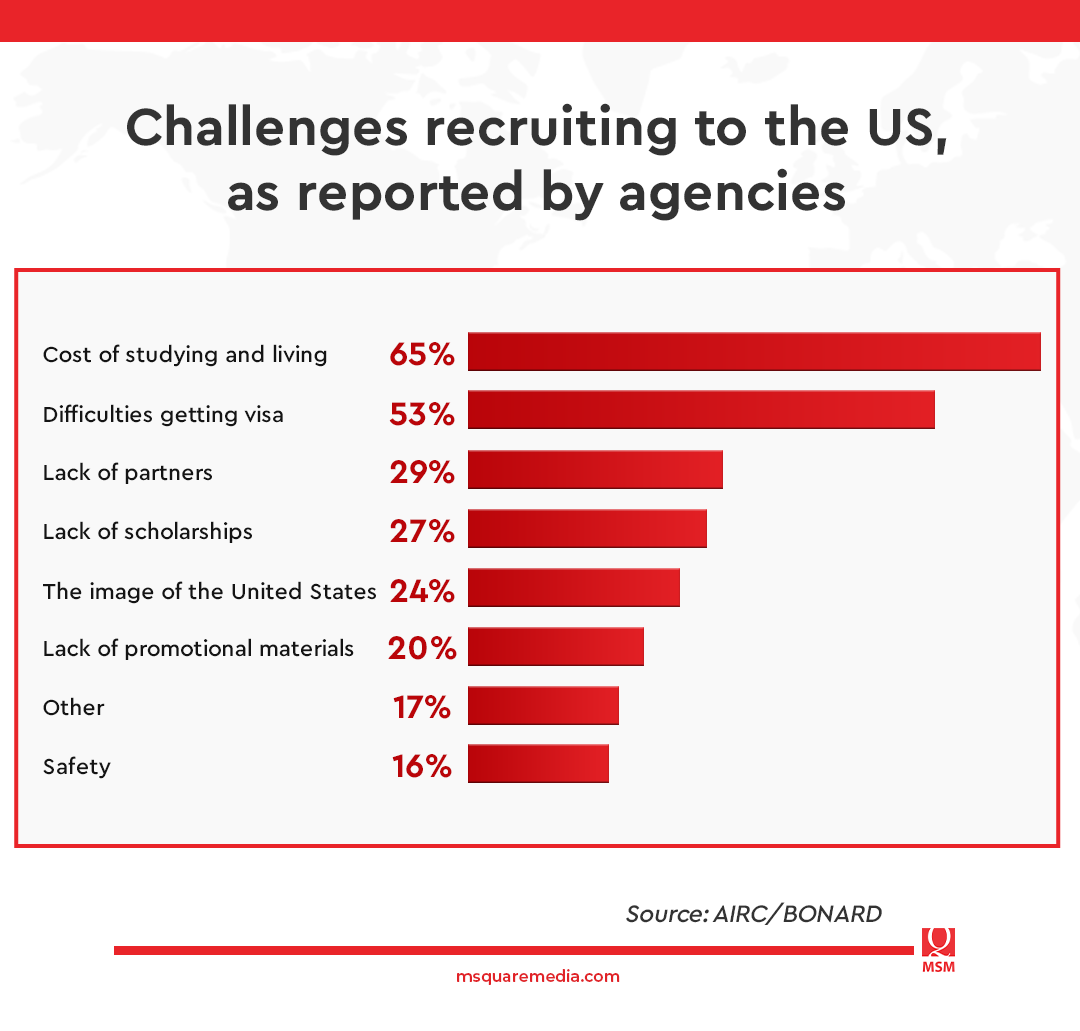Key Takeaways:
- Agents excel at targeted marketing, utilizing their knowledge of local markets and student preferences to effectively promote the programs and offerings of institutions.
- The survey reveals that the majority of universities (62%) are actively collaborating with education agents, which represents a significant increase from prior years.
- A significant proportion of education agencies (29%) report an insufficient number of US collaborators, indicating the untapped potential for further collaboration between agents and colleges.
Education agents have a significant impact on the recruitment of international students by colleges and universities. Their extensive networks and market expertise result in an increase in enrollment, which attracts a larger pool of qualified candidates. Agents excel at targeted marketing and recruitment, effectively promoting the institution’s programs and offerings by leveraging their knowledge of local markets and student preferences. They streamline the application and admissions process by assisting students with forms, documentation, and deadlines, thereby relieving admissions offices of administrative burdens. Education agents also provide invaluable cultural and linguistic support, bridging the communication divide for international students and assisting them in navigating the obstacles associated with studying abroad.
And despite the sad reports of fraudulent education agents sending international students abroad with fake admission letters, a new survey revealed that nearly two-thirds of US colleges are actively engaged with agents.
The Growing Trend
Higher education institutions in the United States have increasingly turned to the employment of education agents in recent years. The American International Recruitment Council (AIRC) and Bonard, an industry research firm, recently released the results of a survey that shed light on this trend, finding that the vast majority of US universities (62%) are actively involved with education agents. This is a huge jump from prior surveys, which only showed a 37% share in 2016 and a 49% share in 2021. The report provides valuable insights on the competitiveness of the US education market for international students.
More than nine in ten schools (98%) that aren’t already working with agents are thinking about partnering with agents in the near future. This pattern reflects a societal shift and may indicate that the foreign student recruitment landscape is evolving.
According to Patrik Pavlacic, Chief Intelligence Officer at BONARD, the rise in colleges working with agents indicates a sector-wide shift. As the higher education landscape moves past the challenges posed by the pandemic, study destinations worldwide are engaging in aggressive competition for student recruitment. This shift towards increased collaboration with agents is expected to shape the future of international student enrollment in the US.
The Agents’ Perspectives
Agents play a crucial role in the recruitment of international students by US institutions. According to the responses of agents to the survey, a number of factors motivate their recruitment efforts. 54% of agent-respondents cited market demand and student preference as their primary motivation for recruiting for American institutions. This suggests that agents’ main driving force is a desire to accommodate the needs and preferences of students looking for opportunities to pursue higher education abroad.
In addition to market demand and student preference, agents also highlighted career opportunities (18%) as a significant factor influencing their recruitment efforts. This indicates that agents recognize the attractiveness of educational institutions in terms of the career opportunities they can offer to international students.
Agents also cited expanding the variety of institutions served (18%) as a significant motivation. This indicates that agents are attempting to diversify the educational options they offer students, catering to various academic disciplines, program offerings, and institutional profiles. By doing so, agents hope to meet the specific needs and aspirations of their student clients more effectively.

Nevertheless, agents face obstacles in their recruitment efforts. In the survey, agents cited costs (65%) and visa issues (53%). The financial implications involved in the recruitment process, including marketing expenses and travel costs, can be burdensome for agents. Additionally, navigating the complexities of visa processes and requirements can pose challenges to ensuring smooth and timely student enrollment.
Interestingly, nearly a third of educational agencies (29%) reported a lack of sufficient US partners. This suggests that there is untapped potential for further collaboration between US institutions and agents. By forming partnerships with more education agencies, US colleges can expand their reach and attract a broader range of international students.
Looking Ahead
The future of international student recruitment in the United States is set to be shaped by the growing number of universities that are partnering with education agencies. Competition among study-abroad locations is heating up as the world begins to recover from the pandemic. Keeping an eye on the scenario in the near future will shed light on how US schools adjust recruitment techniques to compete globally for student enrollment.
Colleges in the United States can expand their international influence by working with education agents to pool resources and expand their reach. Agents specializing in international education have extensive networks and local expertise that help universities recruit students from all around the world. These representatives are in a prime position to market the schools and their offerings to prospective students since they have insider knowledge of the preferences, trends, and needs of the local student population. (SUNEETHA QURESHI)

SUNEETHA QURESHI
MSM President
Suneetha has worked for 15 years in the international education sector and 25 years overall for her work for other industries. As president of MSM, she fortifies its business development outreach globally, particularly in the face of MSM’s foray into edtech-based recruitment via MSM Unify. She preserves the premium, value-adding services provided to each MSM partner institute, including dedicated teams on the ground, agent management, lead generation and inquiry management, application prescreening, and student and parent support through pioneering pre-departure briefing sessions.
She has an impeccable track record of successfully launching the representative offices in Asia and Africa of many North American and European higher education institutions. Her key strengths include hiring, training, and developing teams as evidenced by the successful results of the dedicated in-country college and university client teams.
Suneetha also has taken the lead in developing several initiatives at MSM, including building robust standard operating procedures, the Rise ‘n Shine team engagement platform, and the organization’s data analytics and audit segments.
Sources:
- 2023. Nearly two-thirds of US colleges now working with agents. Icef Monitor. Retrieved from https://monitor.icef.com/2023/05/nearly-two-thirds-of-us-colleges-now-working-with-agents/
- 2023. Indian students facing deportation from Canada due to fake admission offer letters. CIC News. Retrieved from https://www.cicnews.com/2023/04/indian-students-facing-deportation-from-canada-due-to-fake-admission-offer-letters-0434570.html

